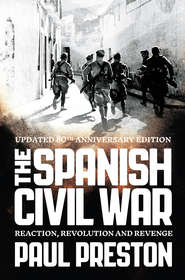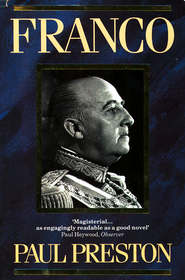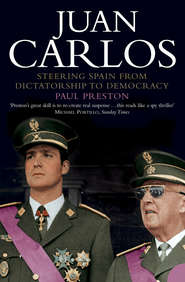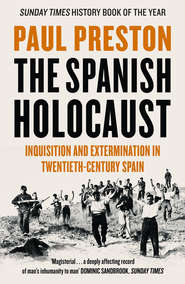По всем вопросам обращайтесь на: info@litportal.ru
(©) 2003-2024.
✖
Doves of War: Four Women of Spain
Настройки чтения
Размер шрифта
Высота строк
Поля
Margot was obliged to wait until Pip was ‘disinfected and de-loused’ before she could see her. When she remonstrated with Princess Bea about the horrors being experienced by Pip, the Infanta replied, ‘I promised you, dear Margot, that I would look after her as my own daughter; and if I had a daughter she would surely be at the front.’
(#litres_trial_promo) Pip spent ten days with her mother in Zaragoza with daily visits to Épila. One evening, she met Peter Kemp, the Englishman who had volunteered for Franco and was now a lieutenant in the Spanish Foreign Legion. He told her a gruesome tale about the sadism of his colonel. An Englishman had crossed the lines claiming plausibly to be a sailor who had ended up at the front after getting drunk in Valencia. When Peter Kemp requested permission to set him free, the colonel ordered him to shoot the sailor. When Kemp stared unbelievingly, the colonel shrieked, ‘What is more, shoot him yourself or I will have you shot.’ He duly took the man into the countryside, they shook hands and he was shot. Pip commented, ‘A nasty thing to have to do.’ Her account implies that Kemp shot the man himself
(#litres_trial_promo) There was a standing order from Franco that all captured foreigners be shot. This was rescinded on 1 April 1938 when he needed prisoners to exchange for the 497 Italians captured at Guadalajara.
On her return to her unit, still weak from the paratyphoid, Pip was driven by the constant humiliations to which Captain Roldán subjected her and Consuelo to contemplate leaving. Once more, her mind was taken off the problem by her work. She took part in an operation on a twelve-year-old girl who had been playing with a hand grenade that had exploded –
I think I minded seeing her being treated and operated on more than anything else I have seen so far. I can’t bear to see children hurt. She was blood from head to toe, her whole body one mass of burns and superficial wounds, both her knees had to be operated, one arm amputated above the wrist as her hand had been blown clean off, the thumb of the other hand (or what was left of it) amputated and two holes in her forehead and all one side of her face sewn up. Apart from which she is temporarily blind in one eye and permanently in the other. She is getting on quite well now but moans and shouts all day as she is in awful pain. I had a terrible quarrel with Roldán yesterday evening to get him to allow her aunt to stay with her all night.
To Pip’s horror, Roldán planned to leave Consuelo behind when the unit made its next move. However, Pip was prostrated with a fierce attack of the paratyphoid that had afflicted her for the previous two months. Left behind, she and Consuelo found refuge in another hospital and volunteered to work at an emergency clearing station right at the front. However, Pip’s delight at this opportunity was short-lived. With her temperature at 39.8°, she was sent to rest at Épila. She stayed there for a month and then, on 7 July, she returned to England for five weeks of convalescence. Exhaustion, the trauma of her front-line experiences and serious illness had at last brought her down.
(#litres_trial_promo)
Pip reached England completely drained. She spent six weeks recuperating mainly at Chirk and more briefly in London. In the capital, she attended the lavish society wedding of her sister Gaenor and Richard Heathcoat-Amory on 18 July. She was the first of eight bridesmaids attired in ‘picture dresses of white chiffon, the bodices made with heart-shaped necklines and short, puffed sleeves, with narrow waist-belts of silver ribbon and headdresses of stephanotis with bows of blue ribbon’.
(#litres_trial_promo) With her health restored, Pip set off back for Spain on 19 August 1938, accompanied by Consuelo, who had joined her in London. They travelled by sea with sixteen pieces of luggage ‘including two packing cases’. Pip was heartened to have been told by a fortune-teller that, within six weeks, she would be engaged to be married. ‘I hope she is right because that is exactly what I intend.’ It was a slow and boring trip to Gibraltar where she was cheered by the prospect of seeing Princess Bea and even more delighted to collect a new car, ‘very large and impressive, black with pale brown leather inside and all its gadgets attached’. Her old car, already without wheels, had met an untimely end in Épila when the garage roof had collapsed on it. Spending time with Princess Bea and anticipating seeing Ataúlfo, her spirits soared. En route to Épila, they stayed at the ancient Roman town of Mérida in Badajoz. It was crammed with aviators who had been moved down because of the minor Republican counteroffensive in Extremadura. ‘I do love being back here. I adore seeing everyone in uniform and a vague atmosphere of war.’ In her absence, Prince Ali had been promoted to full colonel and was now in charge of the newly created Segunda Brigada Aérea Hispana, which was about to go into action on the Ebro front.
(#litres_trial_promo)
Once at Épila, Pip was overjoyed to discover that Ataúlfo had fourteen days’ leave which he planned to spend driving around southern Spain with one of his German fellow aviators, named Koch. She and Consuelo were invited to accompany them. Pip wrote in her diary: ‘I really must marry that man but my luck does not seem quite to run to that as yet, but as I have waited four years now I suppose I can wait longer.’ She had a wonderful time on the trip, driving over dusty roads through villages of white houses shimmering in the blazing sun passing donkeys laden with panniers overflowing with grapes. ‘I am so pleased with life that I don’t know what to do with myself. It is fun to feel like this. It must be years since I last felt such an untroubled confidence in Life. I love every moment of it.’ The idyll was nearly interrupted when Koch was summoned to Zaragoza because of the simmering Munich crisis. It seemed that Ataúlfo would have to drive him there. However, a return to Épila would mean that Pip and Consuelo would need to seek a new medical unit and return to front-line duty. The danger was averted when Koch flew back to Zaragoza and Pip was able to go on falling deeper in love with Ataúlfo. Unfortunately, when driving from Seville to Malaga, things came to a head. He told her that her mother had tried to get him to marry her sister Elisabeth and called him a pansy when he demurred. He then said, ‘After Alonso died, I promised Mama that I would only marry a Princess.’ She was devastated – ‘Such a simple sentence and it just sent all my hopes and the foundations of my life crashing. I had not realised until he said that, just how much I had been building on the chance of my marrying him one day.’ Ataúlfo’s was a noticeably different version of the story about the Infanta Beatriz told to Pip by Princess Bea and was probably an equally feeble subterfuge to avoid telling her that he just had no inclination to marriage.
(#litres_trial_promo)
Pip went through agonies trying to pluck up the courage to ask Ataúlfo if he would have married her if he had not made the vow. If he said ‘yes’, then she would try to get Princess Bea to release him from the promise and, if ‘no’, then try to get on with the rest of her life. They had moved on to Torremolinos, then a tiny and beautiful fishing village. On the following day, driving to Malaga to go shopping, she asked the fateful question and he replied in the negative. Deeply embarrassed, he told her that he was not in love with her. She answered, ‘I knew that. I just wanted to know exactly how things stood. Please forget I ever asked you.’ Then their aristocratic training came to the rescue and they reverted to amiable small talk. ‘And thus ended all my hopes and longings and ambitions.’ On their return to the hotel in Torremolinos, she broke down and cried ‘with a feeling as if there was no world left’. Pip then spent the day with their friends putting on a brave face. She determined to use every resource of self-control to hide her despair and avoid jeopardising her friendship with Ataúlfo. By the end of the day, she wrote: ‘Today has been the longest and most miserable day I have ever spent. Never again in my life am I going to give life such another chance of kicking me.’ Nevertheless, by the following day, her irrepressible optimism had reasserted itself and she was determined to keep on hoping as long as Ataúlfo remained single. ‘I won’t be depressed or take life seriously and tragically,’ she wrote. ‘Life can kick me all it likes but I shall go on laughing and pretending whatever happens.
(#litres_trial_promo) In fact, this was bravado. She showed no sign of being able to relinquish the agonising bliss of her unrequited love.
In September 1938, the Munich crisis gave rise to talk of a European war. British reinforcements were arriving at Gibraltar, down the coast, and Ataúlfo’s German comrades were being recalled to Germany. In such company, Pip’s inclination was to blame Britain. Together with her emotional setback, the ambiguity of her political position left her feeling confused and miserable. The holiday in Torremolinos over, she and Consuelo returned to Zaragoza and Épila in an eventful journey accompanied by two flatulent priests. Continued news of Hitler’s determination to take the Sudetenland did nothing to cheer up the company. Pip’s particular unhappiness was not helped when she was bluntly urged by Juan Antonio Ansaldo to marry Ataúlfo as soon as possible. Despite her efforts to remain stoical, she was deeply miserable. Perhaps in an effort to justify telling Pip that he did not love her, Ataúlfo was giving vent to his viperous tongue. His thoughtless mocking shrivelled her and brought out all her insecurity. ‘God how I hate Ataúlfo sometimes. Why in heaven’s name did I have to fall in love with a louse like him. Now I want to get married and I can’t because I just could not marry anyone else. I want to have lots of children and I can’t. I can’t even have an affair to relieve my feelings.’ The situation became so intolerable for her that she was desperate to get back to the front despite what she took to be hints from Princess Bea that she actually favoured her marrying Ataúlfo.
(#litres_trial_promo)
A return to the front was rendered more difficult by a requirement for certificates of qualifications and proof of previous service. Nevertheless, she and Consuelo went on to Castellón which was near the Valencia front. There they made contact with Roldán and got certificates of their service in his unit. They then found an opening at a hospital at Calaceite on the Ebro front. They returned to Épila where they participated in a big party given by Princess Bea for the German aviators. Pip got pleasantly drunk but then was made to feel bad by vain flirting with Ataúlfo. On the following day, 26 September, they listened to a speech by Hitler giving the Czechs until 1 October to capitulate. It lasted two hours and Pip found it ‘good and moderately disturbing’. Again, her situation made her miserable. She was in the company of Francoists who were fighting alongside German and Italian units. ‘If there is a big war I am completely sunk. I can’t stay here and I won’t fight with France against Germany.’ Contemplating the possibility of war, she wrote: ‘God only knows what I shall do if there is a war. I suppose I shall have to go home but what hell it will be to have to be on the wrong side and with no news of Ataúlfo and the rest of the people out here.’
Starting to work at Calaceite on 29 September did little to animate her. There was little activity in the hospital and, at first, she did not like the other nurses, ‘a pretty gloomy lot’. The ‘wounded’ seemed to be suffering mainly from stubbed toes and scratched fingers. Pip was desperate to prove herself and to be useful. In fact, despite her self-deprecating remarks, describing herself at one point as feeling ‘like a lunatic worm’, reading between the lines of her diary makes it clear that she was extremely competent and hard-working. She rather liked the director of the unit, a lieutenant Magallón, but basically she moped for Ataúlfo. Gradually, she bucked up as the hospital got busier. Twenty-nine-hour stints were not unusual. As before, some of what she had to cope with was deeply distressing – most horrifically, a four-year-old boy who had been playing with a hand grenade that exploded in his face. She and the diminutive magallón were often thrown together on night duty. ‘I would rather listen to the radio with one man than gossip with eleven women.’ She liked him because he gave her interesting work and explained things in a way that improved her nursing skills. He began to groom her as his theatre assistant. She also began to get along with the nurses with whom there were some riotous meals. In reaction to the horrors of the operating table, they drank, sang and danced noisily. One moonlit night, after a hard day, she set up her gramophone and danced the rumba alone on the veranda while open-mouthed patients and colleagues gawked from the windows. Pip was regularly teased about her weight. ‘I am the size of a house now and can hardly do up my uniform.’ ‘I am as fat as six pigs.’ She was working on trying to forget Ataúlfo without great success. She attended a number of bullfights in Zaragoza which she did not much enjoy. She was also distressed to discover that some of her patients who had wounds in the hand were suspected of shooting themselves to get away from the front and would thus be executed.
(#litres_trial_promo)
At one point, Pip accompanied Dr magallón on his rounds in the village. Walking around the cobbled streets of Calaceite, she was fascinated by her introduction to village life about which she wrote amusingly. Their patients ranged from an ‘adorable baby’ to a grandmother in bed in the midst of piles of stored fruit – ‘one of those tough, bald, scraggy old hags of about a hundred’. At one house, ‘I could not make out if the patient was male or female as it had a large, black moustache.’ The patient was, in fact, a woman. The interlude was brief. Pip now picked up a liver infection and was soon extremely ill. Just as she was recovering, after passing ten wretched days, she discovered that another nurse, Maruja, was spreading gossip about her relationship with magallón in order to promote the career of her own beloved, a Dr Torrijos. On Pip’s side, the relationship was entirely innocent but she was aware that magallón was deeply smitten by her. During her illness, he took personal charge of her care and would sit by her bedside stroking her face and hair. Then the front moved. Franco passed through Calaceite to direct the decisive Nationalist counteroffensive at the Battle of the Ebro which was launched on 30 October 1938. Within twenty-four hours, Pip was installed in a new hospital. She was thrilled when, while out with magallón and another nurse looking for a place on the river bank for the hospital linen to be washed, the Caudillo’s cavalcade roared by and Franco himself saluted them.
(#litres_trial_promo) On other days, magallón led fishing expeditions using hand grenades to stun the fish. Her health continued to give cause for concern. In addition to liver problems and dysentery, she had a persistent cough that led magallón to believe she might be tubercular. She also had abscesses on her legs and bottom. Consuelo was threatening to write to Margot to come and collect her daughter.
(#litres_trial_promo)
The continuing relationship between Maruja and Torrijos led to Pip writing cattily in her diary: ‘Romance in a hospital between a jellified skeleton and a prize sow’. She continued to flirt mildly with magallón. ‘magallón seems to spend his life tickling me which I admit he does well and with a uniform and starched apron he can’t go too far if he wants to, which he does.’ That was as far as it went at first, but the gossips in the hospital enjoyed making up more scurrilous stories. Maruja, in particular, was determined to get both Pip and Consuelo out of the hospital and to cause trouble for magallón. Maruja had reported Consuelo as a drunkard and drug addict. This led to Mercedes Milá visiting the hospital and threatening to throw them both out. Eventually, after considerable humiliation, they managed to persuade her of the truth. To be assailed by such nonsense when all she wanted to do was nurse was deeply frustrating for Pip. ‘Why, oh why did I ever come here? Won’t life ever be fun again, however hard one tries to enjoy it. God I hate wars and all they entail.’ As she reflected on the gratuitous malice of Maruja, she was briefly gladdened by a letter from Ataúlfo asking her to come to Épila. However, as she contemplated how pointless it was to go and see him, depression descended again. She had a fight with the deeply jealous magallón and wrote bitterly of Ataúlfo: ‘Why did I ever have to fall in love with a red nosed, begoggled, mother-ridden poop?’ Feeling frustrated, and suffering even more from boils and abscesses, she wrote with characteristic self-deprecation: ‘I expect I will soon have to flirt with magallón. It would be so enjoyable to have a spot of mild sex once more only I am not so sure it would stay mild for long. Only no one can come to much harm with the knowledge that they have their bottom covered with growths!’
(#litres_trial_promo)
At last, the guerrilla war with Maruja was ended by the arrival of a new head nurse named Isabel. A close friend of Consuelo’s mother, she turned out to be very experienced but puritanically strict. Pip gave in to her frustration and she spent the afternoon of 14 November, her last day of being twenty-one, ‘having an enjoyable spot of slap and tickle with magallón, mostly tickle but a nice bit of slap too. His technique is hot even though he is teeny, and one must admit doctors know their way about.’ Her twenty-second birthday was miserable since there was no post other than a telegram from her mother. Her life was rendered more gloomy by a reprimand from Isabel who ordered her not to smoke, drink, swear, sing or fraternise with the doctors. ‘I might just as well be a nun, and it is not my form. I can’t help having been brought up to a lot of liberty and it drives me mad to be spied on and followed about and treated like either a child or a bloody tart who must be reformed. I am quite willing to behave like a nun in the hospital from eight in the morning till nine at night, but at least I might have some enjoyment afterwards.’ In despair at the pettiness around her, she was invigorated by a visit from Ataúlfo and Princess Bea who came loaded with ham, cheese, chocolates, vermouth, brandy, magazines and some correspondence. Ataúlfo was sufficiently nice to her to start her longing for him again. That, plus news from home that her sister Gaenor was pregnant made her sorry for herself. ‘Why oh why can’t the goop realise he is as much in love with me as he is ever likely to be with anybody. My younger sister is married and having a baby, why in hell can’t I do the same. But I can’t and that is that and I shall just have to put up with it.’
(#litres_trial_promo)
By the third week of November, the Nationalists had pushed the Republicans out of the territory captured in July. The Republicans retreated back across the Ebro into Catalonia. Pip’s hospital was to be moved again. As she thought about leaving the hospital, a drunken Legionario told her that he regarded her as his mother. The Pip who was always eager to please was moved to reflect on the consolations of her work.
It really is awfully nice to be able to do things for people and them be grateful even if I do have to lose my temper with them often. I like being relied on for everything. Whatever bothers them, they ask me. Sometimes it is to do with their wound or illness, sometimes clothes, sometimes a quarrel which I automatically have to decide for them, sometimes I am a go-between to get them leave to visit relations or friends. I pretty nearly am their mother, though God forbid I ever have forty-seven children.
These satisfactions were little enough consolation for the petty jealousies that surrounded her. ‘Everyone thinks I am so calm and unemotional; that I don’t mind all the rows and muddles there are but it is driving me potty. Only seeing everyone else in such a state makes me pretend to be even calmer than I would normally appear.’
By the end of November, she was in a country house called Monte Julia in the deserted hills near Tremp in the north of Lérida. She threw herself into converting it into a hospital, rounding up charladies in nearby villages and requisitioning furniture from deserted houses. Her ownership of a car put her right at the heart of the operation. ‘I am going to buy myself a chauffeur’s uniform and give up being a nurse. All I seem to do is drive my car.’ She was also, as a result of her various ailments, getting a lot thinner. Moreover, shrugging off the injunctions of the head nurse, Isabel, she was now flirting very heavily with magallón who claimed to be in love with her. Although Isabel rightly suspected the relationship, she said nothing to Pip who regarded her as ‘that damn, filthy-minded, frustrated, cackling old hen’. ‘It makes me livid because I know that even if I had sat all night on duty in complete silence knitting the matter would be exactly the same. And what right has she to think the worst of me?’
(#litres_trial_promo)
Pip was disgusted by the strange combination of spiteful gossip and reformatory school atmosphere at the hospital. She found it difficult to relate the petty jealousy behind the denunciations to
the pretty illusions of heroism and justice with which I came to this filthy country. Everyday I think more of giving up the whole thing and going home. Why should I go on helping such a set of swine at the cost of feeling continually ill and tired and being covered in boils and lice. And yet I know that if I go home and have no worries, I shall worry so much about Ataúlfo that it will be worse, and I am too much in all this war to be able to walk out and leave it flat for good.
Pip continued to get thin since everything she ate nauseated her. Much as she delighted in weight-loss, she was concerned by the fact that she got palpitations just from walking up stairs. She infinitely regretted her flirtation with magallón and tried to break it off gently. Even though his wife came to join him, he continued to importune Pip.
Driving to Prince Ali’s base at Fraga, twenty-five kilometres to the south east of Lérida, she saw convoys of lorries. Franco was preparing the final offensive of the war, against Barcelona, which suggested that the hospital would be moved again.
(#litres_trial_promo) On 22 December, she drove to Épila and immediately began to feel better. She went to a hairdresser in Zaragoza, lounged around with Ataúlfo and briefly put the horrors of the hospital behind her. Christmas Day was organised on totally English lines, complete with turkey and plum pudding and a tree with lights. However, it did not feel like Christmas – partly because, despite the Orléanses’ hospitality, she was depressed to be an outsider at another family’s festivities. ‘The only thing that makes me realise it really is Christmas Day is that I have eaten too much and feel sick.’ In fact, she was also downcast by a letter from her mother. Recounting a conversation that she had had with the Infanta in London, Margherita van Raalte relayed yet another version of the Orléans family explanation for Ataúlfo’s disinclination to marry Pip: ‘she says that Princess Bea is terribly fond of me but Prince Ali is set on royalty and that Ataúlfo is not in love with me as he knows me too well, but is fonder of me than anyone else.’ Despite again being told that it was futile to hope, her interminable optimism came to the fore again. ‘I can’t help my feelings and unless something unexpected happens I shall just go on waiting until the day he marries someone else. I have bloody little hope but still a lot of patience and no other desire in life to fix myself to.’ At least she had the brief consolation that, at midnight on 31 December 1938, Ataúlfo kissed her for the first time in all the years that she had known him. They danced until dawn on New Year’s Day.
(#litres_trial_promo)
By 2 January 1939, Pip and Consuelo were back at Monte Julia where there were no wounded since the Nationalist advance had moved on so rapidly towards Barcelona. The food was almost as poisonous as the atmosphere among staff with little else to do but gossip. The love-sick magallón had boasted to his wife Mercedes that he had slept with Pip. Mercedes, in turn, had discovered from Consuelo that this was untrue. Consuelo wanted Pip to confront him but she could not see the point of having a row. She wrote phlegmatically in her diary:
I would get him slung out willingly if it was not that I am fond of his wife and don’t see why I should hurt her for pride’s sake. God, what filthy swine men are. The trouble is the lousy brute is quite capable of getting angry and going to other people with the story. I would like to reassure his wife that I think him an ugly, slimy, oversexed little pimp so she need have no fear. I would also like to tell him just what I think of him and that one more word out of him and I will go straight to the Teniente Coronel.
She decided to sleep on it. In fact, she did nothing. In any case, she was too occupied with the altogether more exciting news that Princess Bea and Prince Ali were moving to Monzón, forty-eight kilometres to the northwest of Lérida, and barely half an hour’s drive away. Princess Bea asked her to help with the move and also to accompany her on an inspection of the front.
(#litres_trial_promo)
Pip was even more delighted with the war news – ‘our advance is simply shooting along to Tarragona; each day is better than the other’. By the time that she set out with Princess Bea, the Nationalists had already captured Tarragona and Reus. Writing at Mora del Ebro of her satisfaction at the speed of the advance on Catalonia, she noted: ‘The amount of prisoners taken daily is colossal and there is hardly any fighting and very few wounded especially down here.’ They drove to Reus along tranquil lanes through ochre hills dotted with blossoming olive and almond trees. Their idyllic journey belied the fact that they were only a couple of days behind Franco’s forces. As they caught up with the troops marching on Barcelona, Pip began to record fascinating details. At a factory, the returning owner was greeted with pleasure – real or feigned? – by ‘all his workmen and servants’. Outside one of the factory sheds lay the corpses of six Republican soldiers: ‘They were killed yesterday evening so are quite harmless as they don’t smell or anything.’ The roads were packed with troops ‘in groups of about fifty, each with its flag, hundreds and hundreds, dirty, unshaven, carrying guns with their pack and blankets tied round them, all terribly tired, as they had averaged thirty kilometres per day for three days’. Through Pip’s innocently enthusiastic eyes a unique picture emerges.
It is fun to see newly taken big towns. Auxilio Social distributing bread from lorries, men sticking up anti-Red and up-with-Franco posters everywhere, people clearing up debris in the streets, putting down telephone wires, looking for houses for hospitals and offices, and dozens of simple sightseers. Unluckily the fun of a frantically pleased population waving flags and making whoopee was missing as all the Catalans are red so don’t look on us very much as heroic liberators.
(#litres_trial_promo)
Despite the comfort of travelling as Princess Bea’s companion, Pip made the courageous decision to join a unit of Franco’s Moroccan Army Corps. It meant risking the Infanta’s displeasure and giving up the possibility of frequent meetings with Ataúlfo, but ‘after all, I came here to work’. To her chagrin, Mercedes Milá would not permit her friend Consuelo to join the same unit. ‘God knows that I don’t want to go all alone to a new equipo miles from Princess Bea and her family where I know no one and there is no one who can speak a word of English or has anything even distantly to do with my previous life.’ Her decision was all the more plucky given her own war-weariness.
This time last year I was in Ventosilla wildly excited that at last I was off to the front. How much one year can wear out one’s enthusiasm and vitality. It seems at least five years since I left Ventosilla and God how sick I have got of the war in that time … if I have to spend another wartime Christmas here I shall die of depression and worries and illnesses … If only the war could be over so that I could stop worrying about Ataúlfo and go away somewhere and never move, speak or think for a month. I am tired out both morally and physically.
Her new unit was in the agreeable surroundings of the elegant resort of Sitges to the south of the Catalan capital. Billeted in a fashionable hotel, the sun and the beach cheered her as did the news that Barcelona had fallen on 26 January 1939. The prospect of being among the first to enter the city excited her and her morale was further bolstered by the fact that she was the most competent of the nurses in her new unit and was given plenty of responsibility. On 27 January she visited Barcelona with the rest of her unit.
It is a lovely big spacious town and quite unharmed though very dirty. We drove madly all round it. The port is a shambles due to the hard work of aviation. The streets were crowded with people showing considerable enthusiasm. Everyone shouting and cheering and all the girls parading up the streets with flags. The troops marching through were surrounded by cheering crowds and everyone was in splendid form. And yet as soon as one was out of the main streets, where all the fun was going on, the people looked surly.
To her disappointment, her unit was ordered to stay in Sitges as the Moroccan Army Corps was not participating in the rest of the advance. There, with astonishing energy, she singlehandedly created a functioning hospital out of the chaos of broken beds, tangled bed linen and boxes of utensils dumped by a convoy of lorries. There being little military activity she was able to drive to the Orléans house in Monzón and to marvel at Ataúlfo’s brand-new grey Condor Legion uniform. In Barcelona, she was regaled with horror stories of the Communist ‘checas’, the dungeons in which political prisoners were tortured and interrogated. Her hospital was moved to a lunatic asylum at San Baudillo de Llobregat and Pip was delighted to be in sole charge. In fact, the war was virtually over in Catalonia and there was talk of her unit being sent to Extremadura.
(#litres_trial_promo)











